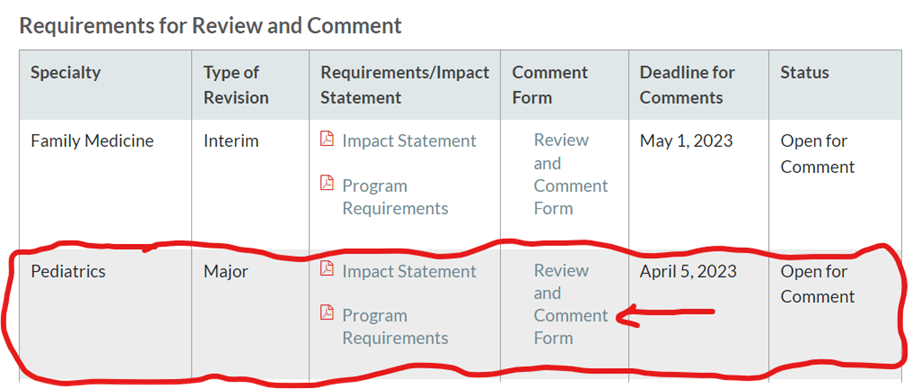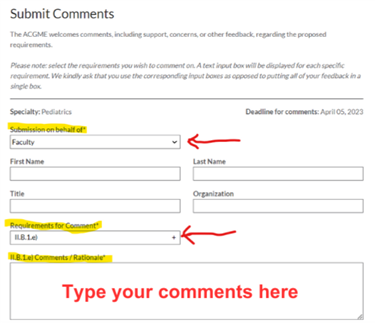Requesting Support on Advocacy Issue for Developmental-Behavioral Pediatrics
March 22, 2023
![]() https://www.acgme.org/what-we-do/accreditation/review-and-comment/
https://www.acgme.org/what-we-do/accreditation/review-and-comment/
The Accreditation Council for Graduate Medical Education (ACGME) is proposing changes to how pediatric residents are trained to evaluate and care for patients with developmental disabilities and behavior challenges. The proposed changes would remove the requirement for a board-certified DBP to teach the pediatric residents, and instead allow pediatric residency program directors to have faculty without DBP board certification to teach the residents. Please lend your voice to oppose these critical changes in pediatric residency education by posting comments on the ACGME Review and Comment page before April 5, 2023.
The issue:
The Accreditation Council for Graduate Medical Education (ACGME) is proposing changes to how pediatric residents are trained to evaluate and care for patients with developmental disabilities and behavior challenges. The proposed changes would remove the requirement for a board-certified DBP to teach the pediatric residents, and instead allow pediatric residency program directors to have faculty without DBP board certification to teach the residents.
Why this matters:
- Health care needs of youth with developmental-behavioral disorders: Magnitude & issues. Recent estimates in the United States show that 17% of children aged 3 through 17 years have one or more developmental disorders (DD) [Cogswell ME et al. MMWR Morb Mortal Wkly Rep. 2022], while 23% have a developmental, mental, or behavioral problem [National Survey of Children’s Health 2020-2021, https://www.childhealthdata.org/). Despite this high prevalence, numerous gaps in care exist for this important group, with 68% of caregivers of children with developmental, mental, or behavioral issues reporting that their children received no developmental services, 36% reporting difficulty getting the specialist care that their child needed, and 38% reporting frustration in their efforts to obtain necessary services for their child [National Survey of Children’s Health 2020-2021]. The ACGME Pediatric training program requirement (Section IV.C.6.a) that Pediatric residents must have 4 weeks of developmental-behavioral pediatrics (DBP) training is explicit recognition that DB disorders are highly prevalent, making skills in DBP care foundational for any practicing pediatrician.
- Role of Developmental-Behavioral Pediatricians (DBPs). Developmental-Behavioral Pediatricians (DBPs) are uniquely qualified to care for youth with DD and to provide education in Pediatrics residency programs on this population’s needs and medical home requirements. DBPs have expertise in: diagnosing developmental-behavioral and learning conditions; evaluating for medical etiologies as well as psychosocial and environmental contributors to these disorders; and developing treatment plans that address developmental and behavioral functional impairments (via medical/medication interventions as well as non-medication interventions delivered by collaborating interdisciplinary allied health professionals) [Weitzman CC, et al. Pediatrics. 2022]. Requiring that Pediatric training programs have a board-certified DBP faculty member acts as an important quality control standard for residency training related to DBP care.
The implications:
This critical change in how pediatric residents are trained to care for children and adolescents with disabilities can have serious unintended long-term consequences, such as
- Adverse effects of proposed change on health and well-being of youth with DD. The ACGME’s proposed change that residency programs no longer need to have any faculty members with formal, standardized training in developmental-behavioral pediatrics will worsen already documented insufficiencies in Pediatric residency education. Pediatric primary care providers currently report inadequate training to provide effective care to children and youth with autism spectrum disorders and other DD (Mazurek MO et al. The Journal of Pediatrics. 2020). As noted above, families also report substantial difficulties obtaining the necessary care for children with developmental-behavioral disorders [National Survey of Children’s Health 2020-2021]. Removing the requirement that Pediatrics residents are taught by certified Developmental-Behavioral Pediatricians will exacerbate primary care pediatricians’ deficits in the skills needed to: understand the appropriate diagnostic evaluation for children with suspected autism spectrum disorder, DD, and other developmental-behavioral conditions; serve children with DD as an adequate medical home; deliver primary care that addresses their unique needs; and collaborate effectively with the specialty services that they require.
- Negative effects on institutional commitment to DBP care, the DBP workforce, and access to care for youth with DD. If this change is implemented, institutions will lack incentive to invest in DBP faculty teams and high-quality subspecialty services for youth with DD. Removing exposure to certified DBPs as models and mentors for Pediatric residents will also decrease the likelihood that trainees will become interested in and pursue DBP subspeciality training. Hence, this change will not only impair access to quality primary care for individuals with DD (by weakening Pediatric training programs), but will also worsen their access to subspeciality care. Given that developmental-behavioral issues disproportionately affect underserved communities, this worsening access will exacerbate existing health inequities.
Where we stand:
The Society for Developmental and Behavioral Pediatrics opposes the ACGME’s proposed changes to pediatric residency education.
Possible Solution:
Alternatives to the proposed change. Rather than waiving the requirement for Pediatric training programs to have DBP faculty, shortages in DBP faculty members could be addressed by encouraging institutions without DBP faculty to provide joint appointment and joint salary support for DBP faculty located at partnering institutions or in private practice. This cross-pollination of DBP faculty, utilizing in-person experiences and/or leveraging technology for distance learning, could increase access to board-certified DBP physicians in developmental-behavioral specialist “deserts,” increase resident exposure to DBP faculty, and increase teaching opportunities across institutions. Such a strategy has been employed to increase access to specialists in diabetes care [Noya C et al, The Diabetes Educator, 2020].
What you can do:
Please lend your voice to oppose these critical changes in pediatric residency education by posting your comments on the ACGME Review and Comment page before April 5, 2023.
Here’s how to comment:
- Go to the ACGME web site for Review and Comment: https://www.acgme.org/what-we-do/accreditation/review-and-comment/
- Scroll 1/3 down of the page (past the Shaping GME section) to “Requirements for Review and Comment” table and choose Pediatrics (see first image below)
- On the Pediatrics row, click on the table box “Review and Comment Form”

- On the Submit Comment Form (see 2nd image below):
- On Submission on behalf of drop-down menu, select “Faculty”
- On Requirements for comment drop down menu, select Section II.B.1.e)
- Enter your feedback in the box immediately below.








